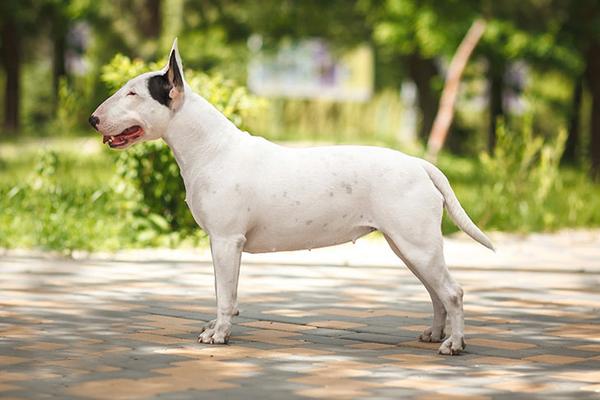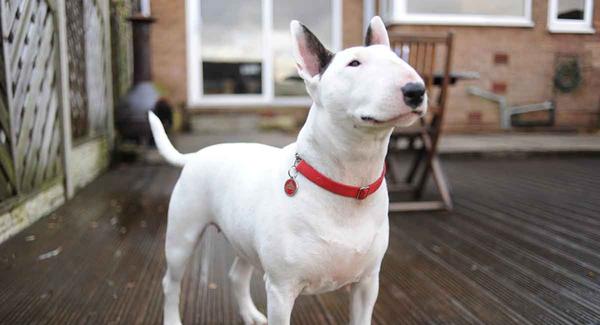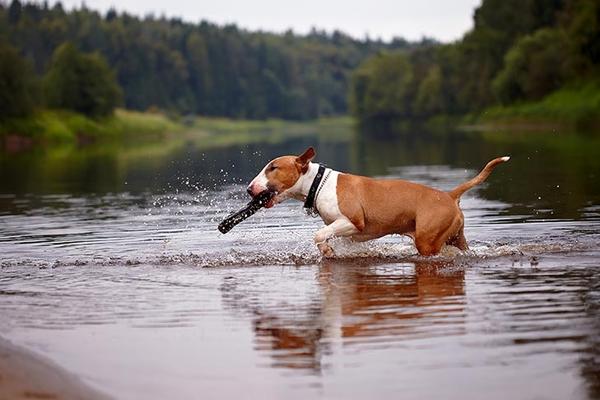Bull Terrier
also known as Bully, English Bull Terrier, Gladiator

 History
History
The Bull Terrier is a breed of dog that is well-known for its distinctive egg-shaped head and friendly, playful nature. This breed was first developed in the 19th century by breeding bulldogs and terriers together in order to create a dog that would be good for bull baiting, ratting, and other similar activities.
The breed was first officially recognized by the Kennel Club (UK) in 1873, and later by the American Kennel Club (AKC) in 1885. The Bull Terrier Club of America was established in 1885 as well.
The breed's name, "Bull Terrier," comes from its origins as a cross between bulldogs and terriers. The goal of breeding these two types of dogs together was to create a dog that would combine the strength and tenacity of the bulldog with the agility and intelligence of the terrier.
The man who is credited with creating the Bull Terrier is James Hinks, an Englishman who began breeding bulldogs and terriers together in the mid-19th century. Hinks' goal was to create a dog that would be better suited for bull baiting than the traditional bulldog, which had become too slow and heavy for the sport.
The breed was originally developed for use in bull baiting and dog fighting. This blood sport was popular in England in the 18th and 19th centuries and bulldogs were often used as the dogs to bait the bulls. However, as the bulldogs became too slow and heavy for the sport, breeders began to cross them with terriers to create a faster and more agile dog.
Another interesting historical fact about the Bull Terrier is that it was once known as the "White Cavalier" because of its distinctive white coat and chivalrous nature. The breed was also popular among the upper classes in Victorian England, and was often kept as a status symbol.
The Bull Terrier also played a role in World War II, as the breed was used by the British Army as a messenger dog, scout dog and sentry dog.
It is also worth mentioning that the bull terrier was also featured in popular culture. For example, the bull terrier "Spuds McKenzie" was used as the mascot for Bud Light beer in the 1980s and 1990s, and the Bull Terrier "Petey" was featured in the "Our Gang" (later known as "The Little Rascals") movies and cartoons of the 1920s and 1930s.
In addition, the bull terrier has been the subject of literature and painting, such as in George Earle Buckle's painting of 'Bull Terrier' in 1886 and also in Ernest Hemingway's "The Killers" short story, which features a bull terrier as the pet of one of the characters.
This dog breed has changed over time and the Bull Terrier's appearance has evolved, but it remains a strong and distinctive breed that is beloved by dog lovers all over the world.
Breed Information
Is Bull Terrier a purebred?
Purebred
What were Bull Terriers originally used for?
Guarding, Ratting, Herding
How Long Do Bull Terriers Live? What is average life expectancy for a Bull Terrier? How long can Bull Terriers live?
10-12 years
The average Bull Terrier lifespan is somewhere between 10-12 years, provided they aren't beset by any exceptional health issues or injuries.
Bull Terrier Height & Weight
How big is a full grown Bull Terrier?

| Height | ||||
|---|---|---|---|---|
| Average | 6 months | 12 months | 18 months | |
| Male | 21-22 inches (53.3 - 55.9 cm) | 13.5 inches (34.3 cm) | 17.0 inches (43.2 cm) | 20.0 inches (50.8 cm) |
| Female | 21-22 inches (53.3 - 55.9 cm) | 12.5 inches (31.8 cm) | 16.0 inches (40.6 cm) | 19.5 inches (49.5 cm) |
| Weight | ||||
|---|---|---|---|---|
| Average | 6 months | 12 months | 18 months | |
| Male | 60-70 pounds (27 - 32 kg) | 34.0 pounds (15 kg) | 55.0 pounds (25 kg) | 65.0 pounds (29 kg) |
| Female | 50-60 pounds (23 - 27 kg) | 33.0 pounds (15 kg) | 52.0 pounds (24 kg) | 57.5 pounds (26 kg) |
Do Bull Terriers get fat easily?
![]()
![]()
![]()
![]()
![]()
They are known for having a strong tendency to become overweight. It is important to find a balance between providing enough exercise and controlling their food intake. To maintain a healthy weight, it is recommended to increase the frequency and duration of daily walks and to engage in more playtime with the Bull Terrier.
Are Bull Terriers Hypoallergenic?
No
Unfortunately, the Bull Terrier is not hypoallergenic, making it not a good choice for a dog lover who suffers from pet allergies.
What is a Bull Terrier personality? What are Bull Terrier dogs best known for?
Active
Protective
Trainable
Keen
Sweet
Tempered
Are Bull Terriers heavy shedders? How Much Does a Bull Terrier Shed?
![]()
![]()
![]()
![]()
![]()
Bull Terrier dogs are not heavy shedders, but they will lose a significant amount of hair each year. To decrease the amount of shedding, you can regularly brush your Bull Terrier. This will remove loose hair and keep his coat growing in the same direction.
What is the watchdog ability of a Bull Terrier dog?
![]()
![]()
![]()
![]()
![]()
The Bull Terrier dog is one of the best choice if you want a good watchdog. This breed will keep watch over you and your family at all times. This breed takes this task seriously and will typically perform its guarding duty with little to no training. This dog will require obedience training, or you can consider guard dog training to sharpen its skills.
Breed History
Where do Bull Terriers come from?
England
What are Bull Terriers descended from?
Bulldog, Old English Terrier
What organizations or kennel clubs recognize/register the Bull Terrier breed?
American Canine Registry
American Kennel Club
America's Pet Registry
Canadian Kennel Club
Dog Registry of America Inc.
Federation Cynologique Internationale
Kennel Club of Great Britain
North American Purebred Registry, Inc.
American Canine Association, Inc.
Australian National Kennel Council
Continental Kennel Club
National Kennel Club
New Zealand Kennel Club
United Kennel Club
When were Bull Terriers first bred? How old is the Bull Terrier breed?
1800s
What Breed Group is a Bull Terrier?
Terrier (AKC:1885 & UKC)

Bull Terrier Appearance
What color are Bull Terrier eyes?
Brown
What color can Bull Terrier nose be naturally?
Black
What color can Bull Terrier coat be naturally?
Fawn
White
Pied
Brindle
Red
How long is a Bull Terriers coat?
![]()
![]()
![]()
![]()
![]()
Bull Terriers are known for their short coat.
How Dense Is The Bull Terrier Coat?
![]()
![]()
![]()
![]()
![]()
What is the texture of the hair of a Bull Terrier?
Straight
How many puppies can a Bull Terrier have in a litter? How many puppies can a Bull Terrier have in her first litter?
10-12 puppies per pregnancy
A Bull Terrier can have a litter of 10-12 puppies on average. However, it's worth noting that the size of the litters can vary greatly. Factors that can influence litter size include the health of the mother, breeding history, and genetics.
![]()
![]()
![]()
![]()
![]()
The adaptability of Bull Terrier dogs is a well-known trait, they are known for being able to adjust well to different living environments and lifestyle changes.

Bull Terrier Health Issues
Do Bull Terriers have a lot of health problems?
![]()
![]()
![]()
![]()
![]()
The Bull Terrier is a very healthy breed, with little need for frequent vet visits. However, it's important to keep an eye on their health and have them checked by a veterinarian when needed.
What are the major health concerns to be aware of when owning a Bull Terrier?
Deafness (Whites)
Kidney Problems
Mitral Valve Disease
Lethal Acrodermatitis
What are the less significant issues to keep in mind when it comes to Bull Terriers?
Entropion
Ectropion
Demodectic Mange
Eye Disease
Laryngeal Paralysis
What are the occasional tests recommended for Bull Terrier breed?
Cardiac
Eye
Blood Test
Hearing (Whites)
Up:Uc Ratio For Kidney Function
Skin Scraping

Bull Terrier Needs and Activities
Do Bull Terriers have a lot of energy?
![]()
![]()
![]()
![]()
![]()
Bull Terriers are known for their high energy levels, so if you're looking for a more low-key dog, this breed may not be the best choice.
Do Bull Terriers need socialization? How social are Bull Terriers?
![]()
![]()
![]()
![]()
![]()
Bull Terrier have very high social needs. These needs include regular mental and physical stimulation, a job or purpose, and companionship. They thrive in environments where they have a lot of interaction with humans and other dogs.
How much exercise should Bull Terriers get?
![]()
![]()
![]()
![]()
![]()
The Bull Terrier dog needs significant physical activity to maintain a healthy lifestyle. They are also well-suited for those who lead an active lifestyle and enjoy activities such as running, hiking, or other outdoor pursuits.
How much sleep should a Bull Terrier have? Do Bull Terriers sleep a lot?
![]()
![]()
![]()
![]()
![]()
Bull Terriers dogs are tend to sleep less than other breeds, but they still require adequate sleep to maintain good health.
Does a Bull Terrier drool a lot?
![]()
![]()
![]()
![]()
![]()
The Bull Terrier is a breed of dog that is characterized by its minimal drooling, making it an ideal choice for people who dislike drool marks on their clothing.
How much does it bark?
![]()
![]()
![]()
![]()
![]()
Bull Terrier dogs tends to bark less frequently than most other dogs. They tend to be quieter and less vocal than other breeds. They may only bark when necessary, such as to alert their owner of something or to communicate something. They do not bark excessively, and may not bark as much as other dogs in certain situations, such as when they are left alone.
Do Bull Terriers exhibit aggressive behavior to safeguard their home and territory? Do they possess a natural tendency to guard?
![]()
![]()
![]()
![]()
![]()
These dogs are known for being extremely protective and make excellent guard dogs. They possess a strong instinct to defend their territory and owners and have a high level of vigilance and alertness.
Are Bull Terriers mouthy?
![]()
![]()
![]()
![]()
![]()
What is the likelihood of a Bull Terrier running away? Do they have a tendency to explore or wander frequently?
![]()
![]()
![]()
![]()
![]()
Do Bull Terrier dogs have a high prey drive?
![]()
![]()
![]()
![]()
![]()
What do Bull Terriers enjoy doing? How do I keep my Bull Terrier busy?
Walking, Tug of war, Fetching, Playing around, Chewing, Running, Jumping, Walk, Sniffing, Fetch, Catch treats, Play, Chase, Eating Snacks, Hiking, Sleep, Camping, Tug-of-war, Beach, Cuddling
What is the energy level of a Bull Terrier? How much energy does a Bull Terrier have?
High
Bull Terriers are high-energy dogs. They need mental as well as physical exercise. These dogs require a lot of your involvement and without it they can, and will, become problematic dogs.
![]()
![]()
![]()
![]()
![]()
How far should a Bull Terrier walk each week? How many miles should a Bull Terrier walk every week?
8 miles / week
There's really no limit to how far you walk your dog as long as they're comfortable. For Bull Terrier, it's at least 8 miles / week. Just remember to build distance and stamina gradually over time.
How much a Bull Terrier should exercise a day? How much activity does a Bull Terrier need?
60 minutes
In general most Bull Terriers usually need at least 60 minutes of exercise daily. This can be spread across the day and include all sorts of high-energy activities, like walking, running and playing.
What level of grooming should be provided for a Bull Terrier?
![]()
![]()
![]()
![]()
![]()
The Bull Terrier is a breed of dog that does not require extensive grooming.
How often should you brush a Bull Terrier?
Weekly
Bull Terrier should be brushed at least once a week. Of course you can give them more frequent brushes if you find that they are still shedding a lot
What are the most commonly used brushing tools for Bull Terriers?
Pin Brush
Comb
Nail Clipper
Costs
How many cups of food does a Bull Terrier eat?
2.5 cups
For an average 60-70 pound (27 - 32 kg) Bull Terrier feed 2.5 cups daily. But, keep in mind, the amount you feed is going to be dependent on the quality of the food you are feeding.
How Much Does a Bull Terrier Cost Daily?
$2.10 - $2.70 / day
The average cost of a Bull Terrier is somewhere $2.10 - $2.70 per day.
How Much Does a Bull Terrier Cost Per Month?
$55 - $73 / month
The average per month expenses of a Bull Terrier is between $55 - $73. This makes an average of $660 - $876 per year. It will be on the higher side when the dog is still small because it will need more frequent visits to the vet, shots.
Bull Terrier Characteristic
How intelligent is a Bull Terrier?
![]()
![]()
![]()
![]()
![]()
The Bull Terrier breed is considered very intelligent and easy to train.
How sensitive is a Bull Terrier dog?
![]()
![]()
![]()
![]()
![]()
This dog breed is particularly attuned to its environment and the emotions of those around it. It can be easily overwhelmed by loud noises, new environments, and unfamiliar people or animals. This dog is best suited for individuals or families who are patient, gentle, and understanding of its sensitive nature. It may also benefit from a calm and stable home environment, with a consistent routine and plenty of positive reinforcement training.
Are Bull Terrier dogs affectionate?
![]()
![]()
![]()
![]()
![]()
Do Bull Terrier do well in apartments? Are Bull Terriers good indoor dogs?
![]()
![]()
![]()
![]()
![]()
The Bull Terrier is an apartment-friendly dog breed. They can do perfectly well in apartments providing they are sufficiently exercised and taken out and about as part of their owner's daily lifestyle.
Are Bull Terriers good with kids? Are Bull Terriers good around children?
![]()
![]()
![]()
![]()
![]()
Bull Terriers are kid-friendly dogs. They are good with children and excellent dogs with children if they are socialized and trained at a young age.
Are Bull Terriers good for elderly?
![]()
![]()
![]()
![]()
![]()
Are Bull Terriers good with cats? How friendly Bull Terriers are toward cats?
![]()
![]()
![]()
![]()
![]()
Bull Terriers are below average friendly toward cats. But with the right training and socialization, Bull Terriers can be good with cats,
Do Bull Terrier dogs get along with other dogs? Are Bull Terriers OK with other dogs?
![]()
![]()
![]()
![]()
![]()
Bull Terriers are below average dog friendly dogs. Bull Terrier dogs may not always get along well with other dogs they have not been raised with,
How do Bull Terrier dogs interact with other pets? Are they considered pet-friendly?
![]()
![]()
![]()
![]()
![]()
Are Bull Terriers friendly with strangers?
![]()
![]()
![]()
![]()
![]()
Bull Terriers are friendly dogs and won't commonly bark at strangers. However, if you wish to change this, training them is easy. With their intelligence, teaching this breed to do anything is pretty simple.
Do Bull Terriers like to play? Are Bull Terriers playful?
![]()
![]()
![]()
![]()
![]()
Bull Terriers are known to be highly playful dog. So if you're not up for all that, think about adopting a slightly older Bull Terrier for a mellower experience.
Are Bull Terrier easily trained?
![]()
![]()
![]()
![]()
![]()
Bull Terrier dogs are known for their ease of training and ability to learn quickly, making them a popular choice for pet owners and trainers alike.
 Pros & Cons
Pros & Cons
Pros
- Rarely barks
If you're looking for a breed that doesn't make a lot of noise, the Bull Terrier dog could be a good pick as they are known for being quiet. - Affectionate
Bull Terriers are affectionate dogs that bond well with their owners. - Apartment Friendly
Living in an apartment is a good fit for Bull Terrier breeds. - Good with children
Bull Terriers are good with children and make great family pets.
Cons
- Not cat-friendly
Cats and Bull Terriers are not a good mix. - Not suitable for first-time dog owners
Bull Terriers require a confident and experienced owner who can provide proper training and socialization. - Not Hypoallergenic
Due to their non-hypoallergenic nature, Bull Terriers may cause allergic reactions in some people. - Not suitable for office environment
A Bull Terrier may not be the best choice for a dog to have in an office setting. - Tendency to gain weight
Bull Terriers have a strong likelihood of becoming overweight. - Prone to certain health issues
Bull Terriers are prone to certain health issues such as hip dysplasia and bloat.